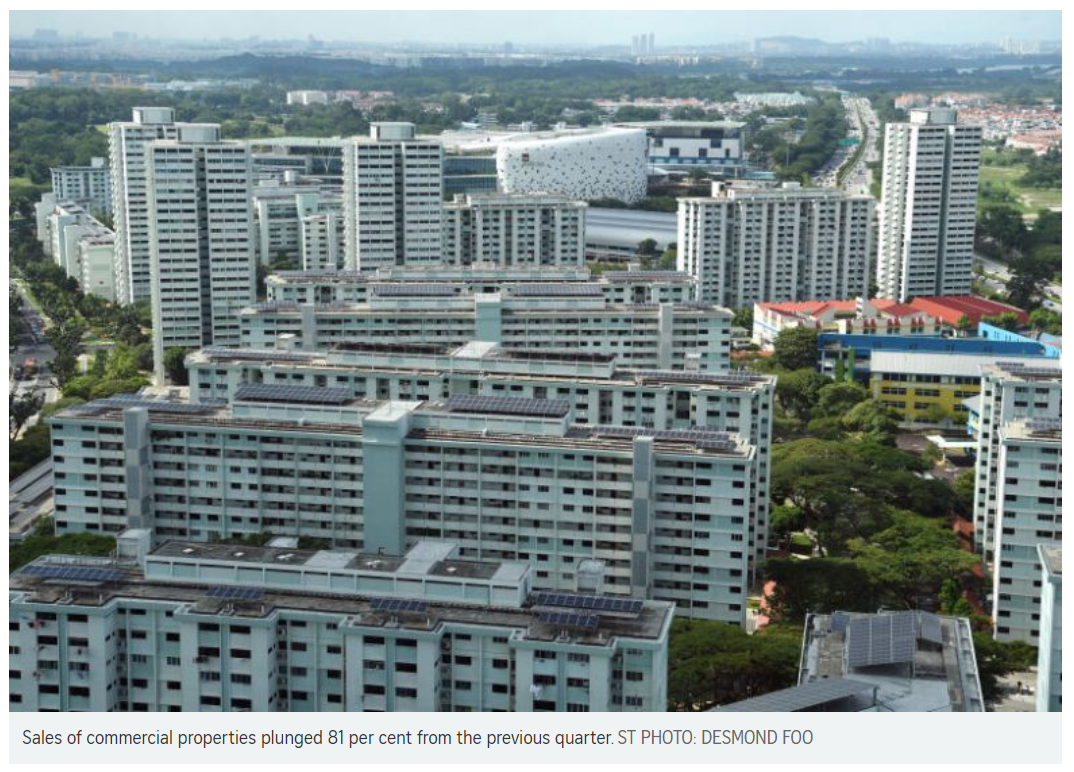Singapore property investment sales take coronavirus hit with 37% Q1 drop: Report
SINGAPORE – Property investment sales in Singapore fell 37 per cent to $3.02 billion in the first quarter of this year from the previous three months as the coronavirus outbreak took its toll on investor sentiment, a report from Cushman & Wakefield on Monday (April 13) showed.
Said Ms Christine Li, its head of research for Singapore and South-east Asia: “Big-ticket commercial transactions were absent in the first three months of 2020, a direct result of the Covid-19 pandemic and the rapid sell-off in stock markets across the globe.
“Sellers were unwilling to lower prices significantly, hoping that the impact on the economy would be temporary and that market confidence would recover rapidly after the pandemic was contained. Meanwhile, buyers were waiting on the sidelines to enter at more attractive prices as it is appearing increasingly likely that the reduction in economic activity from lockdowns will trigger a global recession.”
Instead, first-quarter investment sales, defined as transactions of $10 million and above, was dominated by the residential sector at $2.02 billion, double the previous quarter’s volume, said the report. This mainly came from the award of previously bid government land sale sites.
Looking ahead, real estate services firm expects the “muted tone” in the investment market to continue into the second quarter due to the government-imposed lockdown on non-essential services from April 7 to May 4. If coronavirus infections do not abate, there is the possibility that this “circuit breaker” period could be extended to the rest of the quarter.
The firm forecasts that with a looming global recession, investment volume for the whole year could more than halve to $10 billion-$15 billion from $32.87 billion in 2019 as buyers remain on the sidelines.
But it added: “On a more optimistic note, the decline in interest rates could lead to a rapid return of investment activity in 2021 once investor sentiment recovers after the pandemic is contained.”
For the first quarter if 2020, sales of commercial properties plunged 81 per cent to $183.4 million from from the previous quarter, while the hospitality sector – which covers properties like hotels, serviced apartments and co-living space – clocked no deals as escalating travel bans and lockdowns soured investor appetite.
The industrial sector was not spared but the effect was smaller. Sales here fell 22 per cent to $606.8 million.
Cushman & Wakefield highlighted several strata deals of “palatable quantum”. In the largest office deal of the quarter, a South Korean high net worth individual acquired the 11th floor of Samsung Hub from Sun Venture for $49.8 million. The $3,800 per sq ft (psf) price was a record for the 999-year leasehold property, topping the previous high of $3,550 psf in 2018.
Another notable strata deal was Hong Realty’s divestment of the 10th floor in Suntec Tower One to the Rosa family for $37.1 million or $2,580 psf. This represented a 26 per cent gain from Hong Realty’s purchase price of $29.5 million back in 2018.
The report also noted that Ascendas Reit remained active during the quarter. In the period’s largest private sector deal, Ascendas Reit bought a 25 per cent stake in Galaxis for $102.9 million or $629 psf. As the balance stake of Galaxis is currently held by sponsor CapitaLand, there could be a future injection of the remaining 75 per cent into the Reit in subsequent quarters, said Cushman & Wakefield.
Ascendas Reit also sold Wisma Gulab to Heap Seng Group for $88 million and 25 Changi South Street 1 to Hao Mart for $20.3 million, as part of its strategy to recycle capital into better performing assets.
“We are probably going to see more bite-sized investment deals in the second quarter and into the second half of 2020,” said Mr Shaun Poh, Cushman & Wakefield executive director and head of capital markets Singapore. “Fundamentally, there is still appetite particularly for office, hotel and logistics assets.”
He said the firm has not seen any distressed assets at the moment. He credited this to the various government stimulus packages to help the hospitality as well as the retail-related industries, and the sound financial position of most asset owners.
“Launch activity might resume after the circuit breaker measures are lifted as investors begin to have a better grasp of the market situation and are in a better position to calculate their sums,” said Mr Poh.
Source: https://www.straitstimes.com/business/property/singapore-property-investment-sales-takes-coronavirus-hit-with-37-q1-drop-report


 English
English




